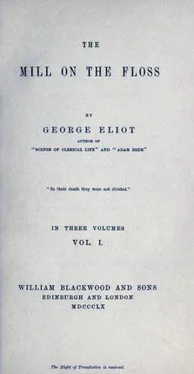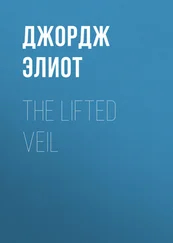If Tom had had a worse disposition, he would certainly have hated the little cherub Laura, but he was too kind-hearted a lad for that; there was too much in him of the fibre that turns to true manliness, and to protecting pity for the weak. I am afraid he hated Mrs. Stelling, and contracted a lasting dislike to pale blond ringlets and broad plaits, as directly associated with haughtiness of manner, and a frequent reference to other people's "duty." But he couldn't help playing with little Laura, and liking to amuse her; he even sacrificed his percussion-caps for her sake, in despair of their ever serving a greater purpose, — thinking the small flash and bang would delight her, and thereby drawing down on himself a rebuke from Mrs. Stelling for teaching her child to play with fire. Laura was a sort of playfellow — and oh, how Tom longed for playfellows! In his secret heart he yearned to have Maggie with him, and was almost ready to dote on her exasperating acts of forgetfulness; though, when he was at home, he always represented it as a great favor on his part to let Maggie trot by his side on his pleasure excursions.
And before this dreary half-year was ended, Maggie actually came. Mrs. Stelling had given a general invitation for the little girl to come and stay with her brother; so when Mr. Tulliver drove over to King's Lorton late in October, Maggie came too, with the sense that she was taking a great journey, and beginning to see the world. It was Mr. Tulliver's first visit to see Tom, for the lad must learn not to think too much about home.
"Well, my lad," he said to Tom, when Mr. Stelling had left the room to announce the arrival to his wife, and Maggie had begun to kiss Tom freely, "you look rarely! School agrees with you."
Tom wished he had looked rather ill.
"I don't think I am well, father," said Tom; "I wish you'd ask Mr. Stelling not to let me do Euclid; it brings on the toothache, I think."
(The toothache was the only malady to which Tom had ever been subject.)
"Euclid, my lad, — why, what's that?" said Mr. Tulliver.
"Oh, I don't know; it's definitions, and axioms, and triangles, and things. It's a book I've got to learn in — there's no sense in it."
"Go, go!" said Mr. Tulliver, reprovingly; "you mustn't say so. You must learn what your master tells you. He knows what it's right for you to learn."
"I'll help you now, Tom," said Maggie, with a little air of patronizing consolation. "I'm come to stay ever so long, if Mrs. Stelling asks me. I've brought my box and my pinafores, haven't I, father?"
"You help me, you silly little thing!" said Tom, in such high spirits at this announcement that he quite enjoyed the idea of confounding Maggie by showing her a page of Euclid. "I should like to see you doing one of my lessons! Why, I learn Latin too! Girls never learn such things. They're too silly."
"I know what Latin is very well," said Maggie, confidently, "Latin's a language. There are Latin words in the Dictionary. There's bonus, a gift."
"Now, you're just wrong there, Miss Maggie!" said Tom, secretly astonished. "You think you're very wise! But 'bonus' means 'good,' as it happens, — bonus, bona, bonum."
"Well, that's no reason why it shouldn't mean 'gift,'" said Maggie, stoutly. "It may mean several things; almost every word does. There's 'lawn,'—it means the grass-plot, as well as the stuff pocket-handkerchiefs are made of."
"Well done, little 'un," said Mr. Tulliver, laughing, while Tom felt rather disgusted with Maggie's knowingness, though beyond measure cheerful at the thought that she was going to stay with him. Her conceit would soon be overawed by the actual inspection of his books.
Mrs. Stelling, in her pressing invitation, did not mention a longer time than a week for Maggie's stay; but Mr. Stelling, who took her between his knees, and asked her where she stole her dark eyes from, insisted that she must stay a fortnight. Maggie thought Mr. Stelling was a charming man, and Mr. Tulliver was quite proud to leave his little wench where she would have an opportunity of showing her cleverness to appreciating strangers. So it was agreed that she should not be fetched home till the end of the fortnight.
"Now, then, come with me into the study, Maggie," said Tom, as their father drove away. "What do you shake and toss your head now for, you silly?" he continued; for though her hair was now under a new dispensation, and was brushed smoothly behind her ears, she seemed still in imagination to be tossing it out of her eyes. "It makes you look as if you were crazy."
"Oh, I can't help it," said Maggie, impatiently. "Don't tease me, Tom. Oh, what books!" she exclaimed, as she saw the bookcases in the study. "How I should like to have as many books as that!"
"Why, you couldn't read one of 'em," said Tom, triumphantly. "They're all Latin."
"No, they aren't," said Maggie. "I can read the back of this, — 'History of the Decline and Fall of the Roman Empire.'"
"Well, what does that mean? You don't know," said Tom, wagging his head.
"But I could soon find out," said Maggie, scornfully.
"Why, how?"
"I should look inside, and see what it was about."
"You'd better not, Miss Maggie," said Tom, seeing her hand on the volume. "Mr. Stelling lets nobody touch his books without leave, and I shall catch it, if you take it out."
"Oh, very well. Let me see all your books, then," said Maggie, turning to throw her arms round Tom's neck, and rub his cheek with her small round nose.
Tom, in the gladness of his heart at having dear old Maggie to dispute with and crow over again, seized her round the waist, and began to jump with her round the large library table. Away they jumped with more and more vigor, till Maggie's hair flew from behind her ears, and twirled about like an animated mop. But the revolutions round the table became more and more irregular in their sweep, till at last reaching Mr. Stelling's reading stand, they sent it thundering down with its heavy lexicons to the floor. Happily it was the ground-floor, and the study was a one-storied wing to the house, so that the downfall made no alarming resonance, though Tom stood dizzy and aghast for a few minutes, dreading the appearance of Mr. or Mrs. Stelling.
"Oh, I say, Maggie," said Tom at last, lifting up the stand, "we must keep quiet here, you know. If we break anything Mrs. Stelling'll make us cry peccavi."
"What's that?" said Maggie.
"Oh, it's the Latin for a good scolding," said Tom, not without some pride in his knowledge.
"Is she a cross woman?" said Maggie.
"I believe you!" said Tom, with an emphatic nod.
"I think all women are crosser than men," said Maggie. "Aunt Glegg's a great deal crosser than uncle Glegg, and mother scolds me more than father does."
"Well, you'll be a woman some day," said Tom, "so you needn't talk."
"But I shall be a clever woman," said Maggie, with a toss.
"Oh, I dare say, and a nasty conceited thing. Everybody'll hate you."
"But you oughtn't to hate me, Tom; it'll be very wicked of you, for I shall be your sister."
"Yes, but if you're a nasty disagreeable thing I shall hate you."
"Oh, but, Tom, you won't! I sha'n't be disagreeable. I shall be very good to you, and I shall be good to everybody. You won't hate me really, will you, Tom?"
"Oh, bother! never mind! Come, it's time for me to learn my lessons. See here! what I've got to do," said Tom, drawing Maggie toward him and showing her his theorem, while she pushed her hair behind her ears, and prepared herself to prove her capability of helping him in Euclid. She began to read with full confidence in her own powers, but presently, becoming quite bewildered, her face flushed with irritation. It was unavoidable; she must confess her incompetency, and she was not fond of humiliation.
Читать дальше












